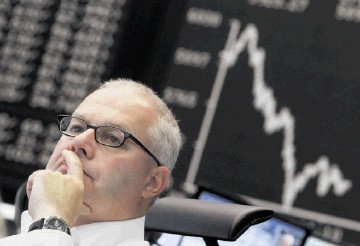
Oil traders are poised to cash in on low crude prices by storing vast quantities of the commodity until prices rise.
Global demand for supertankers is already growing as companies look to take advantage of the weakest oil prices in years.
The price of a barrel of Brent crude has plunged nearly 50% since June due to a global supply glut but the economics for storing crude at sea have until just recently remained unfavourable.
Industry sources say that with prices for prompt Brent deliveries dropping sharply versus later contracts in the past week, traders are increasingly requesting to lease vessels for storage.
Large-scale storage at sea is now profitable for the first time since the financial crisis more than five years ago, meaning the world’s biggest commodity traders can make a fortune by holding oil in bulk until the market price recovers.
Dutch company Trafigura alone stores and transports more than 1million of barrels of crude every day, highlighting the scale of potential benefit for companies able to hold on to oil supplies for a while.
Another Dutch firm, Vitol, headed up by Scots businessman Ian Taylor, has a joint venture operating oil and gas terminals, storage tanks and pipelines in 14 countries on five continents.
A market structure known as contango allows traders to lock-in profits by buying oil now and selling it forward for later delivery, as long as the costs of storage are low enough.
Austrian oil and gas research centre JBC Energy says the current contango on the Brent market is already “sufficient to make floating storage viable based on average 2014 freight rates”.
A contango in 2009 led to more than 100million barrels being stored on tankers and sold later, and analysts at JBC Energy expect 30-60million barrels of oil to be stored offshore worldwide in the first six months of 2015.
The International Energy Agency expects 300million barrels of crude to be put into storage globally, including onshore and offshore, in the first half of 2015.
So far this year, oil held at sea has been no more than a few tankers as the discount for the front month of crude futures has been insufficient to finance chartering.
Tanker owners have also preferred to trade their ships rather than opt for floating storage as vessels normally deteriorate when kept stationary.
But a build-up of stocks caused by lower-than-expected demand could force the front of the crude oil market into a bigger discount, and encourage floating storage.
London-based tanker broker EA Gibson Shipbrokers has said there may come a point when “the rapid build-up of surplus crude in the market will open opportunities for floating storage”.
Recommended for you
